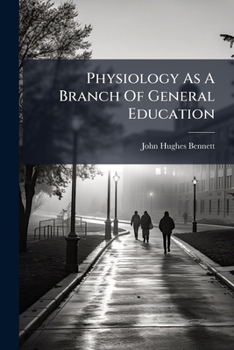Physiology As A Branch Of General Education: A Graduation Address Delivered August 1, 1871
In "Physiology As A Branch Of General Education," John Hughes Bennett makes a case for the importance of physiological study as part of a well-rounded education. Delivered as a graduation address on August 1, 1871, this speech advocates for the integration of scientific knowledge, particularly physiology, into the broader curriculum. Bennett argues that understanding the functions of the human body is not merely the domain of medical professionals but is essential for all educated individuals. He suggests that such knowledge empowers individuals to make informed decisions about their health and well-being.
This address provides a snapshot of 19th-century educational philosophy and the growing recognition of science's role in general education. Bennett's advocacy for physiology reflects a broader movement to incorporate scientific disciplines into traditional curricula, enhancing the intellectual development of students and preparing them for the challenges of a rapidly changing world. "Physiology As A Branch Of General Education" remains relevant for those interested in the history of science, medicine, and education.
This work has been selected by scholars as being culturally important, and is part of the knowledge base of civilization as we know it. This work was reproduced from the original artifact, and remains as true to the original work as possible. Therefore, you will see the original copyright references, library stamps (as most of these works have been housed in our most important libraries around the world), and other notations in the work.
This work is in the public domain in the United States of America, and possibly other nations. Within the United States, you may freely copy and distribute this work, as no entity (individual or corporate) has a copyright on the body of the work.
As a reproduction of a historical artifact, this work may contain missing or blurred pages, poor pictures, errant marks, etc. Scholars believe, and we concur, that this work is important enough to be preserved, reproduced, and made generally available to the public. We appreciate your support of the preservation process, and thank you for being an important part of keeping this knowledge alive and relevant.





